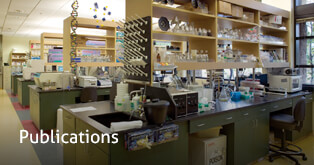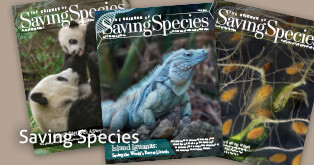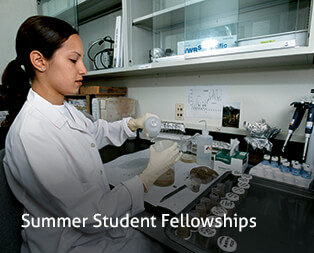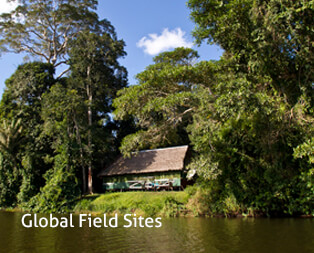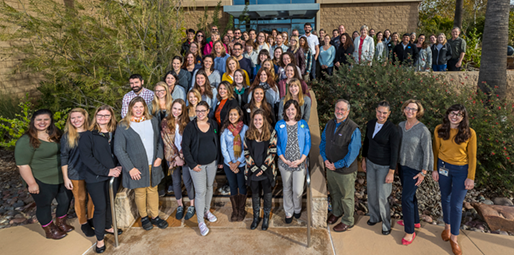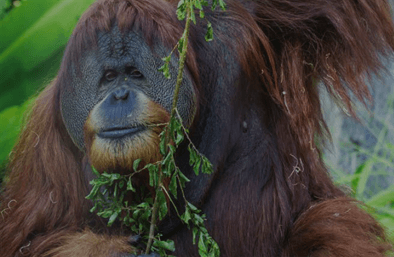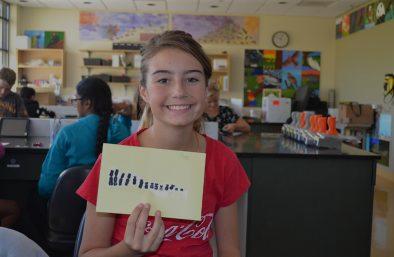San Diego Zoo Wildlife Alliance offers undergraduate Summer Fellowships on our Conservation Science teams: Recovery Ecology, Population Sustainability, Community Engagement, Conservation Genetics, Plant Conservation, Reproductive Sciences, and Disease Investigations.
The Conservation Science Summer Fellowship is a 12-week program where undergrads work directly with a mentor from the Conservation Science team of their choice. Within those 12 weeks, the fellows gain hands-on experience while completing a project. Fellowships are based at the Beckman Center (Escondido, CA) unless otherwise stated.
Applications for the 2024 Conservation Science Summer Fellowships can be submitted until February 15, 2024. Applicants should specify which team’s fellowship they are applying for; applicants can only apply for one team, not multiple teams.
Current undergraduate students must be officially associated with a college or university to be eligible for the fellowship program. Undergraduates who are currently enrolled in college meet this criterion, as do graduating seniors who are continuing their education in the fall following graduation. Recent graduates who are not continuing their education in the fall of the same year are not eligible to apply.
Summer 2024 Conservation Science Summer Fellowships
- May cohort: May 20–August 9
- June cohort: June 24–September 13
Fellowships are 40 hours per week for 12 weeks. Fellows will receive a $7,000 stipend. To apply, submit your resume and cover letter to Holly Davis at hodavis@sdzwa.org.
Conservation Science Teams
- Community Engagement is driving conservation action through science education and community collaborations. Our applied conservation social science group conducts research on human-wildlife interactions so that conservation strategies address both the threats species face as well as the needs of local communities. The work of the team involves understanding human behavior and viewpoints to inform species conservation planning.
- Conservation Genetics uses innovative genetic and cellular approaches to assess, monitor, and manage endangered species, contribute to their sustainability, and prevent species extinction. They conduct collaborative research using cellular biology and genome-wide sequencing to develop tools for species of conservation concern. They use cells as models to advance conservation efforts, propagate and reprogram tissue culture cells to produce induced pluripotent stem cells, and direct their development for genetic rescue efforts for critically endangered species.
- Disease Investigations’ mission is to remove disease as a roadblock to wildlife conservation. They identify and solve health problems by carrying out comprehensive disease surveillance programs, disease outbreak investigations, and targeted disease research for all the animals in our facilities and field conservation programs. Fellowship research projects generally focus on pathology, toxicology, and/or molecular biology. This fellowship is based either at the Beckman Center (Escondido, CA) or the San Diego Zoo (San Diego, CA).
- Plant Conservation researches the restoration and management of rare plant populations, both ex situ and in situ. This team is seeking two research fellows, one to join the Torrey pines restoration and management project and one to join our Native Plant Gene Bank on seed banking, testing, and propagation. Independent projects are developed with mentors to meet program and conservation needs and aligned with the skill sets and interests of the selected applicants. For the Torrey pines project, we would like a fellow to use field and remotely sensed data to examine population dynamics. The Native Plant Gene Bank fellow’s independent project would look at factors influencing the germination of rare plants and/or their propagation. In addition to independent projects, selected fellows will round out their fellowship with work on all facets of Plant Conservation programs.
- Population Sustainability uses an interdisciplinary approach, with a focus on innovative technologies and ecology, to assess and address challenges to the persistence of threatened species. The team is seeking three fellows, one for each of the following projects.
-
One fellow with interest and capabilities in computer vision and/or machine learning. The fellow will work on software systems for processing image and/or video data from field camera systems deployed in a variety of ecosystems globally to automatically produce derived data about the species and individuals present in the imagery and/or their behavior.
-
One fellow with an interest and capabilities in programming embedded systems, particularly in contexts where power is limited. Interest in machine learning inference on constrained devices (e.g. TinyML) and/or low-power radio communication (e.g. LoRa) is a plus. The fellow will work on projects where image and/or inertial data is processed directly on field equipment so that small reports can be transmitted over low-bandwidth connections and/or the equipment can respond autonomously.
-
One fellow with an interest in doing applied conservation genomics for endangered megafauna (including tigers, African elephants, giraffes, and Andean bears). The fellow will apply molecular biology techniques including DNA extraction, PCRs, electrophoresis, and portable sequencing and develop a SNP genotyping pipeline that determines the sex, individual identity, and geographic distribution of samples. Basic understanding of molecular lab techniques is preferred. The work will impact both wildlife forensics and conservation programs worldwide!
-
- Recovery Ecology focuses on large-scale conservation programs that assist in the recovery of endangered and threatened populations locally and globally. They apply scientifically acquired behavioral and ecological knowledge to solve conservation problems. Their conservation toolbox includes developing and testing conservation breeding techniques, reintroduction and translocation strategies, and monitoring and management in species recovery programs. They use approaches that integrate behavioral ecology, population ecology, and spatial ecology with other disciplines. Fellowships will be based at the Beckman Center, with the possibility of some work in field sites and/or conservation research facilities. The team is seeking three fellows, one for each of the following projects.
-
One fellow will work with spatial data and remote sensing imagery from the Safari Park Biodiversity Reserve to classify vegetation types and quantify changes over time in response to invasive plant management and other variables. There will be opportunities to assist with local fieldwork, including drone-based capture of landscape data. The fellow should be familiar with Esri ArcGIS Pro spatial analysis tools, with additional preference given to applicants with experience using R and ENVI software.
-
One fellow will work on an experimental temperature manipulation designed to assess desert tortoise response to climate change. The project will provide exposure to experimental design and analyses of temperature logger and time-lapse video data to answer questions related to tortoise habitat, behavior, physiological performance, or reproductive outcomes under warming scenarios. Research will include occasional trips to field sites in the Mojave Desert.
-
One fellow will work with movement data and provide field support for the ringtail study. Duties include working with trail cameras from various sites in San Diego County and processing imagery to identify ringtails. The fellow will also assist with nighttime trapping and weekly telemetry. This project involves extensive field work, including driving to field sites and hiking long distances through difficult terrain. Preference given to applicants with experience processing trail camera imagery and/or using R software.
-
- Reproductive Sciences innovates and applies science and technology to solve reproductive challenges and to support the conservation of endangered species. The major areas of investigation include gamete physiology, assisted reproductive technology, hormone monitoring, environmental toxicology, avian physiology, and stem cell biology.
Summer Fellowship FAQ
When is the deadline for receipt of applications?
The deadline to apply for 2024 summer fellowships is February 15, 2024. All applications must be received via email by February 15 at 9:30 p.m. Pacific standard time (PST).
What is the start date for the 2024 fellowship?
The start date is determined based on the student's school schedule (semester or quarter), and is either Monday, May 20 (through Friday, August 9) or Monday, June 24 (through Friday, September 13).
Are letters of reference required or advised?
One letter of reference is recommended but is not required. Letters may be addressed to the Selection Committee and should be emailed directly by the author of the letter to hodavis@sdzwa.org. If sending the letter/s by mail, the address is:
Conservation Science, San Diego Zoo Wildlife Alliance
Attn: Holly Davis
15600 San Pasqual Valley Rd.
Escondido, CA 92027
Are specific core biology courses required?
There are no required courses for summer fellows.
Is the program open to any college student?
The program is only open to undergraduate students who are actively enrolled in a degree-granting institution or who will receive their degree in the year they apply and are continuing to a graduate program in the fall of the same year (e.g., master’s degree, veterinary medicine, doctorate).
Can international students apply for the fellowship program?
When an application is submitted, international candidates must be able to show proof they are legally allowed to live and work in the United States during the tenure of the fellowship to be considered. This documentation can be a J1 visa or an F1 with a CPT or OPT visa.
Is the summer fellowship paid?
The summer fellows are full-time, 40-hour-per-week, 12-week positions. Fellows are not classified as San Diego Zoo Wildlife Alliance employees and are paid via a stipend. The current stipend amount is $7,000 for the 12-week program.
What hours are summer fellows expected to work?
Fellows are expected to work a minimum of 40 hours per week. Depending on the specific nature of the fellow's project, after-hours scheduling may be involved, including weekends and/or evenings. These hours must be completed onsite—remote work is not permitted.
Are fellows given holidays/days off?
The May cohort may take off Memorial Day (May 27) and Independence Day (July 4). The June cohort may take off Independence Day (July 4) and Labor Day (September 2).
What are the typical duties of summer fellows?
Specific research projects are only chosen once the fellow meets with the research group's director and other employees within the group. Directors will communicate duties once the specific research project is agreed upon, but they typically involve applying standard laboratory or field techniques to conservation questions.
Can course credit be obtained through the fellowship program?
No credit can be obtained through this fellowship program unless your home campus considers it worthy of credit. This would need to be arranged by fellows independently.
Is public transportation to the Beckman Center available?
It is required that all summer fellows have their own transportation. Bicycles are not a safe mode of transportation due to the high speed of vehicles and the incline of roads to the Beckman Center. Access via public transport is extremely limited and time-consuming, and there is no public transportation on the weekends. Fellows without access to a car will need to arrange shared transportation with other fellows in advance and should be prepared to provide appropriate compensation for any transportation provided. Parking for private vehicles is available at the Beckman Center.
Is housing provided?
Housing is not provided but is generally available through online sources such as Craigslist, Sonder, Airbnb, and Vrbo.
Are fellows given each other's contact information in advance?
Contact information (phone number and email address) for all the summer fellows will be shared as soon as they have been offered and accepted their fellowships.
How can I make my application more likely to succeed?
Obtain more research experience (field and/or lab), provide strong letters of recommendation, keep grades high, and write a thoughtful and meaningful statement of interest that is relevant to the types of projects that occur at San Diego Zoo Wildlife Alliance. Helpful details to include are interests that separate you from the large group of applicants that "like animals" and want to contribute to conservation; scientific expertise; details of practical experience; independent work skills; and a solid commitment to learning about research design, data collection and analysis, and disseminating results in the form of presentations and publications.
Where can I gain the experience to compete in the fellowship program?
Volunteer in a research lab on campus or in the industry and/or volunteer on a field project. Many colleges and universities have opportunities for students to volunteer in the field or the lab with graduate students or professors. Gain as much hands-on research experience as possible!
When will fellows be informed that they have been accepted into the program?
An official offer is emailed shortly after verbal contact and acceptance. The fellowship decisions will be finalized by April 1, 2024.
Is there an orientation to the program for incoming fellows?
Fellow orientation will start at 8:30 a.m. on the first day and will be hosted by the Conservation Science coordinator. After orientation, fellows will start work with their mentors. Social gatherings and other events are arranged throughout the fellowship.
What are the details of the student poster session presentations?
At the end of the summer, fellows participate in a poster presentation session to present their work. Dates are based on when the students start/end their fellowships. Typically, poster sessions fall during the 12th week of the fellowships. Exact dates and more information to follow.

